Top News
March 3, 2013 Ryukyu Shimpo
The Naha District Court sentenced one sailor to ten years in prison (12-years recommended), and the other, a petty officer third class, to nine years (10-years recommended) for the brutal rape of a young woman in Okinawa City last October.
The presiding judge pointed out, “This case is more heinous than similar cases.” The victim stated in her affidavit that she still feels fearful, painful and frustrated, and hopeless.
We can imagine how she feels both physically and mentally, and we highly commend these prison sentences that take the victim’s feelings into account. We want both the United States and Japanese governments to take the judgment seriously, to apologize to the victim, and do their best to compensate her and provide her with psychological care.
After the sentencing, the judge read out messages from citizen judges and himself, saying, “The accused may think that the sentences are severe, but the feelings of the victim and the citizen judges as Okinawans require severe punishment for this crime.”
One of the accused held the woman her tightly by the neck while violating her. They then robbed the victim. Surely there is nothing more contemptible than this type of behavior.
The citizen judges stated, “This is not discriminatory treatment of the accused because they are U.S. military personnel. We made a dispassionate decision.” They stated that they came to the decision by focusing on the cruelty of the crime without seeing U.S. military servicemen as having any special status. This can be seen as a level-headed decision.
In addition to the sentence, we commend the judgment because the messages from the citizen and presiding judges reflect the honest feelings of people in Okinawa who find themselves caught amidst irrational circumstances.
Since this incident crimes have continued to be committed by U.S. military personnel. The U.S. and Japanese governments should take heed of the messages from the citizen and presiding judges. The approach taken by both governments has lacked the seriousness required to prevent further crimes from occurring and to ensure fair treatment for the people of Okinawa.
At the time of the incident, the accused were about to transfer to a U.S. base in Guam. The petty officer third class, one of the accused, stated that he raped the victim because he did not think that he would be caught. The accused clearly did not understand the significance of their actions, and that they effectively trampled over a person’s human dignity. We strongly condemn the U.S. military’s moral education for creating this kind of servicemen.
We once again wish to remind all concerned that Okinawa is not an occupied territory nor a colony of the United States. U.S. military and civilian personnel should not exploit the Japan-U.S. Status-of-Forces Agreement (SOFA) to pull rank on Okinawan people.
The U.S. and Japanese governments should accept the messages from citizen and presiding judges and think deeply about what they represent. Crimes and incidents involving U.S. military personnel continue to occur, undermining confidence in the partnership between the United States and Japan while the both governments avoid the main issue by talking about improving the way the Status-of-Forces Agreement is implemented. Surely the time has come for both governments to recognize the abnormalities in what is an unfair SOFA, and take serious steps to revise the agreement.
(English translation by T&CT, Mark Ealey)
Go to Japanese
Pros of buying Viagra online:
Wondering why you should buy Viagra online at all? Okay with your current routine that requires regular visits to your doctor in order to get and renew your prescription? Well, looks like you don’t really know what you’re missing. Read on – there’s more to ordering Viagra over the Internet than meets the eye.
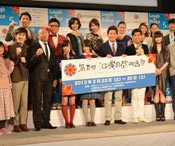
February 20, 2013 Ryukyu Shimpo
The 5th Okinawa International Movie Festival will be held from March 23 to 30 at the Okinawa Convention Center in Ginowan and various other venues. At a special press conference held at the headquarters of Yoshimoto Kogyo Co., in Tokyo on February 19, many comedians, including Garage Sale from Okinawa, talked about the festival. Aiming to increase the number of events and projects involving local people, the organizers set the theme as “Create with the people of Okinawa, and let’s get things going.”
In the section for movies designed to let people know about the regions, five works will be shown including Tax Cyborg Itoman, which is directed by Gori of Garage Sale. All 41 cities, towns and villages of Okinawa were represented in the commercial section in which municipal offices introduce their local attractions. The festival will include a new special screening of collections such as “The Nibichi Film Festival,” video works shown as entertainment at wedding parties, and “Journey around the locations of Uchina movies.”
(English translation by T&CT, Mark Ealey)
Go to Japanese
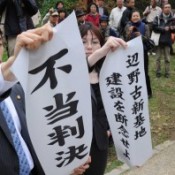
February 21, 2013 Ryukyu Shimpo
On February 20, the Naha District Court rejected a lawsuit in which 621 plaintiffs claimed that the central government’s approach to the environmental impact assessment (EIA) for the relocation of the facilities currently at Futenma to the coastal area of Camp Schwab in the Henoko district of Nago was flawed. The plaintiffs, people both from inside and outside of Okinawa, demanded that the EIA preparatory documents and details of how it would be carried out, be redone, and sought compensation for perceived breaches of the law. Presiding Judge Ryosuke Sakai stated that the residents did not have the right to lodge such a lawsuit, and did not go any further into the issue of the illegalities in the EIA procedure that were pointed out, so the plaintiffs totally lost the case.
With regard to whether or not they will appeal against the ruling, the plaintiffs said, “We cannot allow it to end like this. We will decide what to do after all of the plaintiffs, including local residents, have considered the situation.”
The plaintiffs argued that the central government conducting the EIA in an illegal manner deprived them of their right to express their opinions, something that is guaranteed in the Environmental Impact Assessment Law. In response, the judge pointed out that the law does not guarantee the right to statements of opinion by individuals despite providing residents the opportunity to express their opinions. The judge dismissed the case, stating that the party that initiates a project is not obliged to reflect the opinions of individual residents in its report, nor to answer any questions they may raise.
With regard to the assertion that the government’s failure to release the report violated the human rights of Nago and Ginoza residents who could be affected by the Futenma relocation, the judge stated that the central government conducted the EIA in order to collect environmental information on the area in question, and that the law does not guarantee the residents’ right to express their opinions.
The central government asserted that the law does not stipulate that residents can lodge a lawsuit, and requested that the judge reject the claim by the residents and the demand for compensation.
While the government started the EIA process in 2007, and did publicly call for residents to express their opinions through inspection and explanatory sessions, it repeatedly made revisions and additions to the report. Because the government announced the deployment of the Osprey at a stage in the process that the residents no longer had the opportunity to express their opinions, citizens groups and intellectuals have criticized the government for “cheating” in the process as well as being “unscientific and undemocratic.”
(English translation by T&CT, Mark Ealey)
Go to Japanese
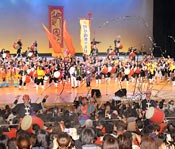
February 25, 2013 Ryukyu Shimpo
On February 24, a performance commemorating the 30th anniversary of the Okinawan eisa taiko ensemble Ryukyukoku Matsuri Daiko was held at the Okinawa City Hall. A total of 350 performers including 60 from 30 branches in Japan outside of Okinawa, and five from overseas, gave a spectacular and vigorous performance befitting their status as the central group for creative eisa. The powerful sound of the drums reflected their confirmation of shared cultural bonds.
The event started in a relaxed manner with a Ryukyuan classical piece called Kagiyadefu bushi, but after that they presented a light but unique dance number in the form of the song Oji jiman no Orion Beer. Singers Hidekatsu and Kazufumi Miyazawa impressed the audience with their songs Mirukumunari, Shimauta and Shinkanucha. To wind up the show, all the performers and people in the audience danced the kachashi together.
The head of Matsuri Daiko, Naomi Kurane, reflected on the group’s 30 years, saying, “Thanks to their creativity, passion and bonds of friendship, the dreams of young people have transcended languages and cultures.”
(English translation by T&CT, Lima Tokumori and Mark Ealey)
Go to Japanese

Go To Video
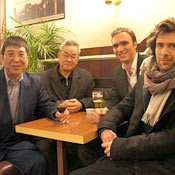
February 18, 2013 Yoko Oshiro, Correspondent of the Ryukyu Shimpo
On January 23, a television documentary movie entitled La Force de l’Age, Power of Age, about the secret to longevity in Okinawa was previewed at a theater in Paris for people involved in the television industry.
Eighth-dan Shorin-ryu karate master Seisuke Adaniya, who runs a dojo in France, participated as the local coordinator.
The audience applauded when producer Constantin Brienst commented that it was thanks to Adaniya that Governor of Okinawa Hirokazu Nakaima and other unique local characters agreed to appear in the movie.
With its distinctly French style, the documentary movie expressed Okinawa’s natural beauty and humorous side of its people, making it more than just reportage. It was created in a way that will make French people think of visiting Okinawa.
The movie took two years to complete, and director Florent Cassiani-Ingoni commented, “The shooting did not work out quite as we intended, and there were aspects of it that were really tough, but I think that the movie came together well thanks to everyone’s cooperation. We will be very happy if many people watch it.”
(English translation by T&CT, Hitomi Shinzato and Mark Ealey)
Go to Japanese
February 16, 2013 Ami Chibana of Ryukyu Shimpo
The Japanese government is working towards early acceptance of the Hague Children’s Convention, which defines the rules for handling of children born to couples in failed international marriages. It is expected that the bill will be submitted to the national Diet in the middle of March and will be adopted in May at the plenary sessions of both houses. In comparison to other prefectures, in Okinawa many international marriages occur between local women and U.S. servicemen, and divorce-related problems are common. A person familiar with this issue in Okinawa said, “The bill limits family courts to having jurisdiction only in Tokyo and Osaka, but it should also include Okinawa. People living in outlying regions should not be disadvantaged.”
According to a representative of Women’s Pride, a group supporting people experiencing troubles in international marriages and relationships with U.S. servicemen or civilian employees, in the past there was even a case in which an ex-husband visited his former wife in Okinawa and took their child away to the United States in a military aircraft.
Representative of Woman’s Pride, Misaki Smith, stated, “Problems occur at a higher rate in Okinawa than in other prefectures because it is host to so many U.S. military facilities. If the central government does ratify the Hague Convention, we hope that they will then give appropriate consideration to the situation in Okinawa.”
Since last summer, the Okinawa Bar Association has been asking Diet members elected from Okinawa and the Diet members in charge of this issue to make it possible for the Naha Family Court to oversee matters related to the return of children. The chairman of the association, Yutaka Kato said, “We will continue to request that the bill be amended. For example, judges could go to local courts to pass judgment. We will request an improvement in how the law is applied so people living in outlying regions are not placed at a disadvantage.”
Professor of law at Okinawa International University, Hisahiro Kumagai, who is an expert on the convention, pointed out that it applies to custody of children who cross borders and that problems occur not only within international marriages but also between Japanese couples. He hopes that the convention will stimulate national debate.
Lawyer Shin Kamata, who submitted a statement to the Ministry of Justice with Professor Kumagai in October 2011, said, “We need to look closely at how law courts adjudicate in cases of domestic violence. I will follow future discussion on the bill.”
Terminology: the Hague Convention
It is a convention written to address international marriage problems the arise when a parent takes a child or children abroad without the other parent’s consent, leaving the other parent unable to see their children. It covers children under the age of 16. In such cases, the member states are bound to research the children’s whereabouts and send them back to the country where they lived previously. In some cases, children refusing to go back are exempted from the requirements of the convention. The convention has been in effect since 1983 and 89 countries, centered on those in Europe and the Americas, are members. Among the world’s wealthiest countries, the G8, Japan is the only one that has not ratified the convention.
(English translation by T&CT, Lima Tokumori and Mark Ealey)
Go to Japanese

February 25, 2013 Ryukyu Shimpo
On February 24, a volunteer group found a large quantity of ordnance in a shelter in Itoman. There were 861 bullets, five hand-grenades and one artillery round that had been stored there during the Battle of Okinawa.
Seventy four year-old Naha resident Isamu Kuniyoshi belongs to a group that has continued to collect the remains of those killed during the battle, and on this occasion they unearthed ammunition in shelters in Maezato and Ozato in Itoman. The shelter in Maezato was used by the Imperial Japanese Army as a field hospital during the Battle of Okinawa.
Kuniyoshi said, “It is unusual to find so many bullets in the same shelter.”
The Japan Ground Self-Defense Force bomb-disposal squad came to retrieve the ordnance on February 23. When the Ministry of Health and Welfare surveyed the shelter in 1994 they found human remains and personal effects. Kuniyoshi said that this shelter is about 350 meters long, and that it is possible that they will discover more remains and personal effects in future.
The information center at Mabuni that coordinates the collection of remains provided this information to the Okinawa Prefectural Government.
(English translation by T&CT, Mark Ealey)
Go to Japanese

February 18, 2013 Yukito Toyama of the Ryukyu Shimpo
On February 6, volunteers set up the Oyama Taimo Fan Club to let people know about the potatoes produced in the Oyama district of Ginowan. Taimo is a tropical plant grown primarily as an edible root vegetable. It goes by several names, including taro. By playing on words linking tanmu in the pronunciation of Okinawan dialect they decided on February 6 as the promotion day for taimo. They are planning to offer a tour of the taimo fields and to hold monthly events. Through such activities, the club hopes to come up with more attractions from taimo.
On February 9 and 10, as its first activity, the members of the club sold bread and pastries made of taimo gathered in Oyama in the harvest festival hosted by the agricultural and marine products dealer Ginowan Yui Marche. Many people queued up for free servings of muji soup that included stems of taimo.
The club is gradually increasing the number of its members, including farmers and dealers of taimo products.
Naoko Nakamura from Ginowan became interested in taimo when she took a walk in the taimo fields in Oyama with her children. She said, “I hope that many people will come and get to know the beauty of the taimo fields.”
For inquiries about the fan club, please send an email to: ooyamataimo@gmail.com
The club also provides information at http://otfc.ti-da.net/
(English translation by T&CT, Megumi Chibana and Mark Ealey)
Go to Japanese
February 16, 2012 Teppei Ikeda of Ryukyu Shimpo
On February 15, All Nippon Airways (ANA) asked the Okinawa Prefectural Government (OPG) to build a facility that maintains aircraft at Naha Airport.
According to those involved within the OPG, Japan Transocean Air (JTA), which has a maintenance base at the airport, also wants to expand the existing facility. The OPG plans to carry out research on the construction of a new maintenance base, and will look for companies that would use the base once it is complete. If ANA succeeds in building such a base at Naha Airport, the airport will become a maintenance hub for air carriers and leading low-cost air carriers both inside and outside of Japan. This would help to promote Okinawa as an international hub for aviation and commodity distribution.
An executive member of the OPG said that ANA is considering the advantages offered by Naha Airport, which boasts Japan’s widest airline network after Haneda Airport, and is looking at expanding its business to the airport. ANA also sees Okinawa’s warm climate as suitable for its painting operation.
At Naha Airport, in addition to its own aircraft, JTA maintains those of Japan Airlines. The people involved in JTA plan to increase employment in Okinawa by expanding the existing facility in the airport, saying, “We want to increase our international competitiveness by expanding the facility. That way we will not be outdone by companies in countries such as China that can provide cheap prices.”
Even though ANA plans to construct a maintenance base near Ominezaki, where JTA’s maintenance facility is located, it is looking for an alternative site because the area around Ominezaki, which hosts the Patriot Advanced Capability-2 (surface-to-air missile) unit of the Japan Self-Defense Forces, does not have any room to spare. The manner in which it will be used and scale of the base is yet to be decided.
In the new development plan the 21st Century Okinawa Vision Master Plan, there is mention that the OPG intends to seek to attract airline companies, expand the airline’s distribution network and investigate the possibility of establishing airport-based industries. This would include aircraft maintenance bases aimed at forming an international hub for commodity distribution by developing the airport site and harbor industries. The OPG expects projects such as aircraft maintenance for low-cost air carriers that are in high demand, to expand in the prefecture.
(English translation by T&CT, Mark Ealey)
Go to Japanese
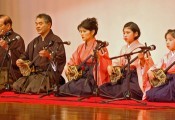
February 17, 2013 Yukito Kinjo Correspondent of Ryukyu Shimpo
On February 10, at the Rural Environment Improvement Center Hall in Ie, 63 year-old Yoshikazu Gima, who is from Ie, his daughter and grandchildren held a charity concert to mark the 45th anniversary of Gima’s career in classical music.
They wanted to bring generations together for a music performance while 92 year-old Yoshiharu Gima, father of Yoshikazu, still enjoys good health.
Nineteen years ago Yoshikazu also held a charity concert at home with his children and grandchildren. About 400 people attended the latest concert, with the family giving 14 performances, including creative dance and a solo performance by Yoshikazu. His eldest daughter, Itsumi Iji, who resides in Kagoshima Prefecture, and her two daughters, eleven year-old Nanako, and nine year-old Natsuki, also performed.
Yoshikazu’s wife Setsuko and second daughter Kazusa danced to his Uta Sanshin performance. Yoshiharu, his son and grandchildren, great-grandchildren performed Inoha Bushi, which made the audience go quiet until the end when the performers drew considerable applause.
Yoshikazu taught his two grandchildren classical music by communicating with them through a cell phone. The eldest grandchild won the golden award in the Nomuraryu Classical Music Preservation Association Contest and the second grandchild won the silver award.
The great-grandchildren sent messages to their grandfather and great-grandfather, saying things like, “I want to win the grand prix crown,” “I want to try various things.” Yoshikazu said, “I am really grateful that we held this concert to bring generations together. I want to continue to devote myself to classical music.”
Part of the money raised through ticket sales, that is 300000 yen, was donated to the Ie Human Resources Development Association.
(English translation by T&CT, Mark Ealey)
Go to Japanese
February 24, 2013 Ryukyu Shimpo
In Washington, Prime Minister Shinzo Abe met with U.S. President Barack Obama for the first time. They confirmed their intention to cooperate in a wide range of fields such as the Trans-Pacific Partnership or TPP and security between Japan and the United States. Abe has declared that “the trust and the bond” in the US-Japan alliance has been restored, but we can’t help but sigh deeply because the two leaders have yet again exchanged empty promises regarding the relocation of U.S. Marine Corps Air Station Futenma, a matter about which the Okinawan people are deeply concerned.
In a joint statement issued after the meeting, with regard to the TPP, which was the focal point of the summit, the two governments confirmed that a prior commitment to unilaterally eliminating all tariffs upon joining the TPP negotiations is not required. Obama allowed room for exceptions to tariff elimination, something that Japan had requested as a condition to taking part in the TPP negotiations.
At the same time, in the statement, as the first of the basic principles, the two governments confirmed that decisions on all goods would be subject to negotiation. There is no doubt that this statement is a compromise struck in order to encourage Japan to participate in the negotiations. Prime Minister Abe made it very clear that he would make the decision to join to the TPP negotiation as soon as possible. However, we must remember that this agreement does not guarantee protection for domestic agricultural products such as rice, a product that the Japanese government currently protects by enforcing high tariffs on foreign rice. There is also strong resistance from a group of more than 200 in Liberal Democratic Party Diet members who are opposed to the TPP negotiations.
We believe that the highest priority for the Prime Minister should be to clearly explain to the public, the advantages and disadvantages of TPP and how the negotiations will be handled.
Prime Minister Abe should not be lightly announcing the country’s participation in the TPP negotiations before entering into a national debate on the matter.
On the still pending issue of Futenma Air Station, while the two leaders agreed to move ahead with their plan to relocate the facilities to Henoko in Nago, the Okinawan governor reiterated his stance that practically speaking relocating the Futenma base within the prefecture is impossible. All 41 heads of the municipalities within the prefecture are clearly opposed to the government’s policy. The two leaders ought to face the fact that the Japan-U.S. agreement on this matter is not in keeping with the reality of the situation.
In the eyes of the Okinawan people, who fervently wish to reduce the excessive burden they are forced to endure because of U.S. military bases, the prime minister’s statement that the Japan-U.S. alliance has been restored implies that Japan is strengthening its policy of subservience towards the United States. We want the prime minister to immediately adjust the rudder to steer us in a direction that eliminates the structural discrimination forced upon the people of Okinawa through the years.
If Prime Minister Abe thinks that not mentioning the timing of the application of the Henoko landfill at the summit serves as an expedient to placate Okinawa, he is horribly wrong. We want him to understand that without drastically improving the situation so the Japan-U.S. Security Arrangements do not force sacrifices on Okinawa, the strengthening and full recovery of the U.S.-Japan relationship is nothing more than an illusion.
(English translation by T&CT, Mark Ealey)
Go to Japanese








 Webcam(Kokusai Street)
Webcam(Kokusai Street)


